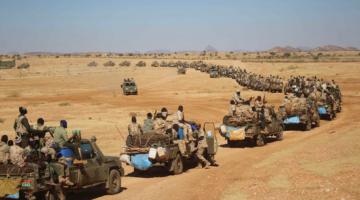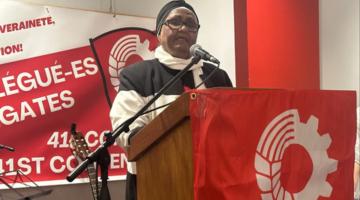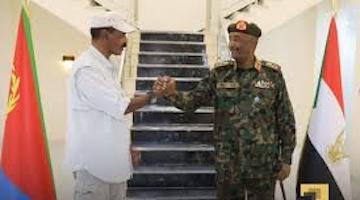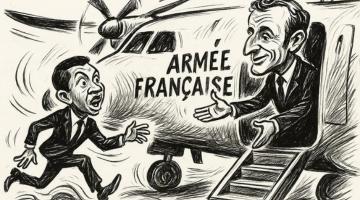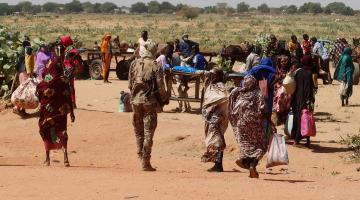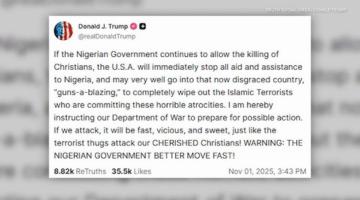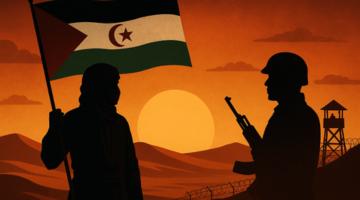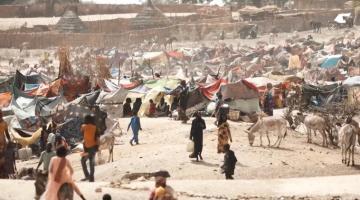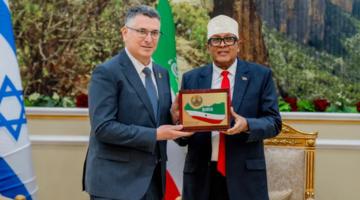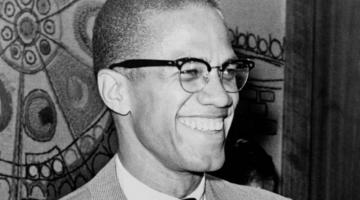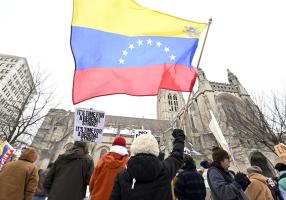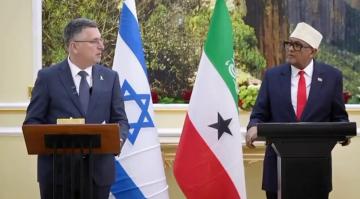“Thus it can be said that British colonialism is mainly responsible for the Southern Sudan problem…”
In the essay “The Southern Sudan,” Joseph U. Garang describes in lucid detail the historical and political events that lead to the secessionist revolts in the Republic of Sudan’s southern provinces following its independence from England and Egypt in 1956. Yet the essay, published in The African Communist in 1969, also provides present-day readers critical historical context for making sense of the Sudan’s postcolonial predicament, including the current civil war. British racial colonialism played no small part in laying the foundation for the emergence of a fractious neocolonial state in continuous crisis.
A Southerner of Luo origin, a Khartoum lawyer, and a member of the Sudanese Communist Party, Garang was executed in 1971 after participating in a coup that briefly brought down the government of President Gaafar Nimeiry. He is remembered as one of Southern Sudan’s foremost progressive theoreticians and politicians; his essay “The Southern Sudan,” is a remarkable reminder of his intellect—and of the kind of vision that was lost with his death. We reprint Joseph U. Garang’s “The Southern Sudan" below.
The Southern Sudan
Joseph U. Garang
Fighting has been going on for six years now in the South of Sudan. I deal with some of the details of the secessionist revolt in a supplementary note appended to the present article, but my main purpose is to set in perspective the historical, social and political setting against which these events are taking place.
The problem of the Southern Provinces the Sudan has been and continues to be a subject of discussion in the camp of the friends of the Sudanese people and in that of their enemies. British and Italian television and press have used it as propaganda fuel to cause animosity between the African and Arab peoples on our continent. Therefore, perhaps it is important to let our friends and brothers know something of the true situation.
This is the more so because the Sudan occupies a unique geographical position, a link and a point of contact between the Arab and African peoples and of their cultures. Further, the Sudan has what is, perhaps, one of the most well-established Communist Parties in Africa and so, naturally, progressive Africans have a right to know in what way Sudanese communists meet the challenge of the national question.
The Southern problem is not the only national question in the Sudan. Though it is the most acute and the most well known, there are others in the West and East of the country, which, in recent years, have begun to assume a significance of their own. As in most African States the Sudanese population is heterogeneous. It is composed of diverse national grouping and tribes, each settled compactly in a different region and all at different stages of development. The center of the county is inhabited by the Arab nationality which is more or less homogeneous, speaking a highly developed language, and economically, politically and culturally far more advanced than the rest of the population. For centuries it has maintained close ties with Egypt and benefitted a great deal from those contacts. The Arab nationality is about 39 per cent of the total population. Bordering on Eritrea and the Red Sea is a national grouping, the Beja. Essentially camel breeders, the Beja occupy an extremely arid region which has forced them to live a nomadic life. Today the Beja have put forward demands for regional autonomy. They number two million. In the far West there are also non-Arab tribes, principally the Fur who, until 1916, maintained a sultanate of their own and today have put forward a claim for some sort of regionalism and have organized a secret society threatening violence. The Nuba of Cordovan province have similar claims.
The Southern Sudanese people, like the Nuba and Fur are negroid [sic], speak about 45 different languages and constitute about 30 percent of the total population. Because there are so many languages their intelligentsia generally address each other in English but the commercial language and lingua franca in the area, particularly in their towns and other centers, is Arabic.
It is obvious from these facts that the national question must be and is given great weight by the Sudanese Communist Party.
Early Period
The origins of the Southern question can be said to date back to Turko-Egyptian rule which incorporated what is now the Southern Sudan into its Sudanese colony in 1838 following the conquest of Northern Sudan in 1821. The Turko-Egyptian administration had definite objects in the Sudan, namely the securing of gold, ivory, ostrich feathers and slaves for the Khedive’s army in Egypt. Turko-Egyptian rule was corrupt and cruel. It levied heavy taxation in cash and kind. In the south this took the form of demanding from villages large and unreasonable quantities of ivory and ostrich feathers on pain of fire and devastation. But the main feature of this regime in the South was the introduction of slaves on a large scale to meet the demands of the Khedivial army and for domestic service in the Arab World and in the Northern Sudan.
Members of the Arab tribes in the Northern Sudan played a big role in the trade, organized scores of armed bands and encouraged inter-tribal wars for the purpose. Naturally the constant harassment of the population by the slavers prevented normal life and made any progress impossible.
Following the Mahdist revolution of 1885 the Sudan became independent for 13 years. But slave trade continued to flourish, for among the staunchest supporters of the Madhi were the big slave merchants who rescinded a new policy of the Turko-Egyptian administration prohibiting slavery.
Slave trade formed the main obstacle to arresting the advancement of the Southern peoples and the contradiction between the slavers and the Southern people constituted the foremost problem of the day.
However, slave trade came to an end in 1898 following the reconquest of the Sudan by Britain and Egypt. It cannot therefore be considered a significant element in, or an essential cause of, the Southern problem today. Nevertheless it is important to mention it not only because it left bad anti-North memories in Southern minds and prejudices in Northern ones (which in themselves are important to the understanding of the situation), but also because the British administration was later to capitalize on this trade in executing its policy of divide and rule.
Era of British Colonialism
The Southern problem has its main roots in the policies of British administration in the Sudan (Egypt played a very minor role in the administration of the country and after the Egyptian revolution, 1919-1924, Egypt ceased to play any role at all).
Conscious and unconscious policies of British colonialism caused gross inequalities in every field between the Southern and Northern (Arab) peoples. It is common knowledge that a capitalist power seizes a territory and turns it into a colony, not to advance the interests of its people, but to monopolise a market and sources of raw materials as well as [to find] opportunities for the export of capital. In the Sudan the main demand of British monopolies was long-staple cotton and this became the more important as the British grip on Egypt and her cotton was, over the years, becoming unstable and uncertain. By a mere geographical coincidence it so happened that lands of the Arab nationality along the Blue, White, and the main Niles were the most suitable for the growing of long-staple cotton. They offered the easiest and cheapest opportunities for gravitational irrigation. Finally there were the potentialities of the Arab tribes as a market for manufactured goods, thanks to their being more culturally and socially advanced than other peoples of the Sudan.
All these factors taken together encouraged British colonialism to concentrate on exploiting the territories of the Arab nationality. The British developed the great Gezira cotton scheme, built railways to expedite trade and the export of cotton and gum, established towns, etc. But in doing so they unconsciously brought modern production and progress to the Arab nationality. Another factor from which the Arab nationality benefitted was the influence of Egypt. In the thirties and forties Egyptian Secondary Schools and Universities began to enroll hundreds of Sudanese students from the Arab nationality, thanks to a common language. Fearing the political influence of Sudanese graduates trained in Egypt, the British administration built secondary schools and a college in the Northern Sudan to train graduates in its own way. And so the number of educated men increased a great deal in the North.
The sum total of all this was that the Arab nationality came to be more advanced than the other national groupings of the country who, because of the poor nature of their territories or their being cut off by deserts or swamps or their remoteness from the sea, did not attract immediate British exploitation on a large scale. Herein lies one of the main sources of inequality between the North and the South.
But that is not all. British colonialism also consciously and deliberately perpetuated conditions of backwardness in the South in fulfillment of its age old policy of divide and rule. What were the main features of this policy? They were: —
(a) the isolation of the South from the North and from the enlightened world in general. In 1922 the Governor-General passed a law known as the Closed Districts Order prohibiting any persons other than natives of the Sudan from entering the Southern Provinces unless by special permit. The order also authorized the Civil Secretary to prohibit any native of the Sudan from entering or residing in the South. Under this provision members of the Arab nationality were effectively kept out, except those trusted by the administration, and foreigners likely to criticize British policy could not enter the South.
In areas where Northern and Southern tribes came into contact, they were separated and large tracts of “no-man’s land” were left to divide them. The teaching of Arabic in Southern schools was forbidden and no Southerner was allowed to speak Arabic in Government offices. No Southern was permitted to wear the Jalabia (the long robe worn by the Arab people), etc.
(b) the distortion of African and Sudanese history was systematically carried out in schools. The Arabs were presented as the only race who carried out slave trade in Africa. History books were illustrated showing long caravans of chained black slaves being led on ropes by Arab slavers carrying whips. Nothing was mentioned about the role of European slavers in Africa nor of the Negro in the United States and how he got there. On the contrary, Europeans were presented as the gallant and God-fearing men who rescued the African from Arab slave trade. These “gallant” men included explorers like Samuel Baker, Stanley and King Leopold of Belgium.
(c) education in the South was limited to the intermediate school level for the purpose of training a few minor clerks, etc. for government offices. Even these schools were not many. There were only three in the whole of the South Provinces, an area of a quarter of a million square miles, and each had a total enrollment of from 70 to 100 pupils at any one time. After 1944 a few Southerners were sent to Uganda secondary schools but not to the North.
(d) Southerners were discriminated against in the civil service. While their colleagues in the North doing the same work received the equivalent of twelve to fifteen pounds sterling per month, the Southerners were paid only twelve to forty shillings for the same period. Southern workers were being paid three shillings per month while their Northern equivalents got from twenty to sixty shillings.
And so it went on until 1954.
This policy was executed by the colonial administration because they had planned to partition the country and annex the Southern provinces to the British ‘possession’ of East Africa. When this failed, owing to Egyptian and Northern opposition and fear of world opinion, the policy nevertheless served as a leaver to delay self-government for the Sudan on the argument that if the British left the country the South world [be] oppressed by the North and that it was essential for the British to remain till such time as the South would have caught up with the North in economic, social and cultural development.
The important point, however, is that when the national liberation movement began in the North after World War II demanding self-determination and expulsion of the colonialists from the country, the South was not in a position to play any important role. Indeed the majority of the Southern leaders of the day, acting under the influence of British colonialist indoctrination, opposed the national liberation movement, citing the argument referred to above.
It will be apparent to anyone that when self-government was grudgingly conceded by Britain in 1954 and offices held by British personnel were Sudanese, no Southerners of sufficient calibre could be found to benefit from Sudanisation and almost all executive posts in the state fell to Northerners. These included posts held by the British in the South. Thus owing to the results of economic and other politics of colonialism the South found itself in an unequal position from the first day of independence in January 1956.
Contribution of Northern Ruling Circles to the Problem
Thus it can be said that British colonialism is mainly responsible for the Southern Sudan problem, for even given a good and conscientious government at the time of independence and after, it would still have taken several decades to eliminate the inequality between the North and the South.
Nevertheless it is now 15 years since independence and nothing fundamental has been done by Sudanese governments to change the situation in the South. Sure, restrictions made by the British were removed. Many schools, hospitals and other social services were made or built in the South. Today there are many Southern university graduates holding executive and technical posts in the government and outside it. There are doctors and lawyers and engineers, though these are not many.
The essence of the Southern problem, however, remains untouched after the lapse of fifteen years. This essence is the distressing economic, social and cultural backwardness of the area and the problem of raising the living standards of the masses of the people. This is indeed a general problem for the whole country, but it is the more so for the national minority regions of which the South is one. Suffice it to say that at this moment about one and a half million Southerners go nude; and per capita income is the lowest in Africa.
Who is responsible for this situation? It is the capitalist and semi-feudal political parties that have been holding the reins of power since independence, as well as the circles standing behind them. For fifteen years these circles and their administrations have insisted on taking the Sudan along the capitalist road of development. But even in this they have not met with any success, for Sudanese capitalism is extremely weak. The country remains predominantly agricultural with only a few light industries, mainly controlled for foreigners. Fifty one percent of the gross national product comes from the traditional sector of natural economy and cattle-breeding.
They have opened the door wide to foreign capital, particularly from the World Bank, Britain and West Germany. They have borrowed large sums from other countries too, including Italy, the United States, Kuwait and even Saudi Arabia, and they have invested the same in agriculture and in schemes intended to pave the way for the private sector. Thus they have been building dams, roads, railways and raising the salaries of the bureaucracy, members of Parliament and ministers etc. In the last three years the government borrowed 85 million [Sudanese] pounds from abroad.
Currently at the bidding of the World Bank behind which stands U.S. imperialism they have begun to dismember the public sector and place it under independent boards and corporations predatory to handing them over to the private sector. Thus railways, airways, power, state industries etc., which were run by ministries, have been handed over to boards.
The doors of the country are wide open to new colonialism, the main danger facing the Sudan today. At the same time elements of old colonialism still control important parts of the economy, particularly foreign trade and modern agriculture through their banks and insurance companies.
Side by side with the failure to build a modern economy and to raise the standard of living of the people, has been the failure of the capitalist and semi-feudal circles to build democracy and create stability in the country. Their attempt to establish “Western” democracy has resulted in a great deal of instability because this democracy is divorced from the masses and does not express their aspirations.
The Constituent Assembly has 218 and yet not a single one of them is a peasant in a country where over 90 percent of the population are peasants. There is only one worker in that assembly. The progressive forces have also only one member. On the other hand about 40 per cent of the membership consists of tribal chiefs and other traditionalists who have an interest in maintaining the status quo. The rest consist of owners of large agricultural schemes, former British-reared bureaucrats, persons connected with foreign monopoly firms and corrupt professional politicians.
Such a democracy cannot modernize the country nor end age-old poverty and ignorance. Still less can it seriously tackle the national question. But before proceeding I must indicate the role played by the Southern leaders in complicating the Southern problem and adding thereto.
The Role of the Southern Leaders
From time to time there have been Southern leaders who saw the way to the solution of the Southern problem in alliance with the progressive and other anti-imperialist forces in the North for the purpose of liquidating the remnants of colonialism, shutting the door in the face of new colonialism and building a modern Sudan and new democracy.
However, these were very few and remain so today in view of the smoldering anti-north prejudices in the Southern provinces.
The vast majority of Southern political leaders, including Ministers, have consistently followed a reactionary road, now allying themselves with the Northern traditional parties (capitalist and semi-feudal), and now allying themselves with imperialism, or with both. They have never sought or desired alliance with the progressive forces in the North, though these are of great influence, as proved by the October 21st revolution of 1964.
In the period of the national liberation movement the majority of the Southern leaders resisted the demand for independence and wanted the British colonialists to stay. So openly were they echoing British views that the national liberation forces in the North lost faith in them and treated them warily as British stooges.
The majority of the Southern leadership leagued themselves with the Northern reactionary parties and circles and overthrew the October government.
Throughout the last 16 years (except under the military regime), the majority of the Southern leaders have been cooperating with the capitalist and semi-feudal circles in the North and participating in their governments. There has been no government formed in which one or another group of them did not have ministerial representation. At the same time this has not prevented them from propagating poisonous diets among the Southern masses, posing the Southern problem as one between the Arab and African races and generally inciting public opinion against the North as a whole. The object of this poisonous propaganda is to discourage contacts between the Southern people and the progressive forces in the North, and it has largely succeeded.
The Southern political leaders have never raised any slogan going to the essence of the Southern question. They have never called for the economic development of the South or for the raising of the standards of its people, or for the application of a new democracy as the only way towards the political solution of the problem. All their demands concern form, not substance. They consider that the problem can be solved within the present framework in the country. Hence their demands for federation, high posts in the civil service, etc. They do not understand under what conditions or prerequisites these “solutions” can work.
The Southern leaders have therefore contributed to the problem. Their main role has been that of a reserve to local reaction and their imperialist allies.
Stand of the Communist Party
In evaluating the Southern movement, the Sudanese Communist Party is naturally guided by the general principles of Marxism-Leninism on the national question and the extent of their relevance to the conditions of our epoch and our country in particular. As is well known, the attitude of the communists towards a given national movement is determined by the question — does it advance the case of progress or social change, or does it not?
Our view of the movement of the Southern Sudan is that it is objectively a struggle against backwardness and for democracy.
As such, the movement can and will eventually form part of the democratic revolution in our country and the Southern problem cannot be fully resolved unless after the victory of that revolution.
At the moment, however, the leadership of the movement is in the grip of opportunists who, as we have seen above, are anti-progressive and flirt constantly with local reaction and Neo-colonialism now raising slogans of self-determination or secession and now raising slogans which benefit only the intellectual stratum and petit bourgeoisie and not the masses.
In the specific conditions of our country and of Africa in general, our party has rejected the slogan of self-determination or secession for the South.
The slogan of self-determination and/or secession means the isolation of the Southern people from the progressive movement in the country. Having regard to the extremely backward conditions in the South (no developed working class, no developed peasant, a very thin stratum of intelligentsia entirely unconscious of the dangers of imperialism and Neo-colonialism: in short, no democratic movement), self-determination or secession would mean the handing over of the Southern people to the imperialists on a silver platter.
The Sudanese people, the entire Sudanese people, exercised their right to self-determination in 1956 when they won independence. The issue is no longer self-determination, but the completion of the democratic revolution begun in October 1964, and the establishment of a new democracy under which the political aspirations of the Southern people can be met.
And so as early as 1954, the Communist Party Central Committee raised the slogan of Regional National Autonomy for the Southern Sudan and the right of the poles of the South to develop their cultures, customs and other national particularities.
This program was affirmed and elaborated upon at the third congress in 1956 and at the fourth congress in 1967.
Since then it has been the subject of our daily activity.
At the round-table conference held in March 1965 between leaders of the North and South, and in the presence of observers from friendly governments, including Tanzania, U.A.R., Ghana (Nkrumah) and Algeria, the Communist Party placed its program of Regional Autonomy on the agenda. Using mass pressure which was powerful after the revolution, the Communist Party forced even the reactionary parties to accept much of this program. However, the program was rejected by the opportunist Southern majority at this conference who insisted on secession.
Today it has become much clearer to us that there is little hope of solving the problem in the absence of a substantial democratic movement in the South. We are making a complete reassessment of our tactics and methods in the South, predatory to our launching a new struggle aimed at building such a democratic movement.
The struggle in our country is assuming clear-cut lines. The reaction forces have, for the first time, grouped themselves solidly together and are intent on consolidating all power in their hands by passing an undemocratic constitution — the so-called Islamic Constitution. On the other hand, the masses of the people in the modern sector of the economy are deserting the capitalist parties wholesale and coming over to the left. The slogans of land reform, the abolition of native and tribal administration (a stronghold of reaction), and the non-capitalist path of development, etc., are becoming the slogans of the masses. Conditions are maturing for a confrontation. In these conditions we will struggle to transform the South from being a reserve of reaction to becoming a vital force in the democratic revolution.
Supplementary Note on the Armed Conflict in the South
The armed revolt in the Southern provinces of the Sudan began in Equatoria Province (bordering Uganda and the Congo and partly the Central African Republic) in 1963 and by 1964 and spread to the other two provinces.
Earlier, in August 1955, the Southern troops stationed in Equatoria had mutinied and they were joined by some of the police force stationed in Near, Yambio, Maridi Yea and Torit; all Equatorial towns. But order had been quickly restored, partly because of the intervention of the British Governor-General. By October 1955, hostilities had completely ceased. The reason for the mutiny had been the dissatisfaction of Southerners with the way “Sudanisation” was affected, and attempts by Northern Distraction Commissioners to coerce public opinion to support the government of the day led by Sayed Ismail el Azhari, the present President of the Council of State.
It should be mentioned that Southern feelings had been worked up by propaganda originating from British and missionary agents, including the spreading of false rumors and the forging of documents to the effect that the then Prime Minister had secretly ordered massacres to be carried out in the South and that Southern troops would be lured to the North and shot.
Some of the mutineers had then escaped to Uganda with their arms and were those who started fighting in 1963.
In 1962 the late Mr. William Deng and others including some former members of Parliament escaped to Uganda where they set up a political party called Southern Sudan Closed Districts Union (later changed to Sudan African National Union). This organization accused the North as a whole of installing the military regime as a means to block Southern demands for a federal Sudan. It thereupon issued a call for an armed uprising aimed at the partition of the country. It found support and financial aid from the Christian missionaries in Uganda and the Congo, particularly the Catholic Church.
This aid was much increased after the military regime expelled all foreign missionaries from the Sudan in February 1964. Financial aid was also received from the Christian Democratic Parties of West Germany and Italy as well as from churchmen and former colonial officials in London. The latter helped by publishing literature and in other ways.
Until the October 21st revolution there had not been any serious fighting except on the borders of Ethiopia and Uganda. The October government decided on a solution by peaceful means and ordered the army not to hunt down the rebels. Unfortunately a Southern Party known as the Southern Front insisted on secession and encouraged the rebels to continue fighting. The rebels made use of the policy of the October Government and poured into the Southern Forests and plains from Uganda, Ethiopia, Congo and the Central African Republic. They sent bands to every district of the South and refused a peaceful solution short of secession.
When the October government fell in February 1965, new elections were held in April 1965 with the result that the reactionary Northern Parties won a majority and formed a government in June 1965. The Southern parties boycotted the election with the argument that no elections should be held in the South unless the problem was solved.
No sooner had the reactionary regime come to power than it launched a counter-offensive and began widespread repression by carrying out mass arrests, assassinations, burning villages, etc. Particularly atrocious were the burning of parts of Juba and the massacre of more than 200 people on July 8, 1965 and the massacre at a wedding party in Wau on July 11, 1965 of 72 Southern government officials and others without justification whatsoever.
The fighting was greater in 1965 and 1966, but since then, though not many rebels have surrendered, both sides have acutely limited hostiles. There is little fighting now going on but the rebels, who number about 1000 men, still remain in the bushes throughout the South and could step up fighting any time.
The rebels get arms from mysterious sources in Ethiopia where they maintain training camps near the border. But the main source of supply was (in 1965 and 1966) from the Congo, thanks then to Tshombe who was “avenging” Sudanese aid to the Congolese revolution. The rebels also used to attack bands of Congolese revolutionaries and seize their arms.
We believe that British and Belgian imperialism, working through the Catholic Church and the Church Missionary Society did a great deal to encourage the rebels both morally and by supplying money to them. It is interesting to note that many of the missionaries who left the South are now to be found on the Sudan-Congo and Uganda borders, and that responsibility for supplying the guerrillas with arms, food, clothing and money was entrusted to one Saturnino, a Southern Catholic priest who was killed by Uganda troops in 1966 for meddling with the Kabaka’s movement.
Of all the border states Uganda has always been cooperative. Ethiopia’s sympathy too is with the rebels but its hand has been restrained by fear that open aid to them would be met by a counter-move by the Sudan to aid the Eritrea rebels. Congo-Kinshasa is in the same position. There is no evidence that the Government of the Central African Republic has given overt aid, though none of these border governments has ever sealed its borders.
Joseph U. Garang, “The Southern Sudan,” The African Communist 37 2nd Quarter (1969)

